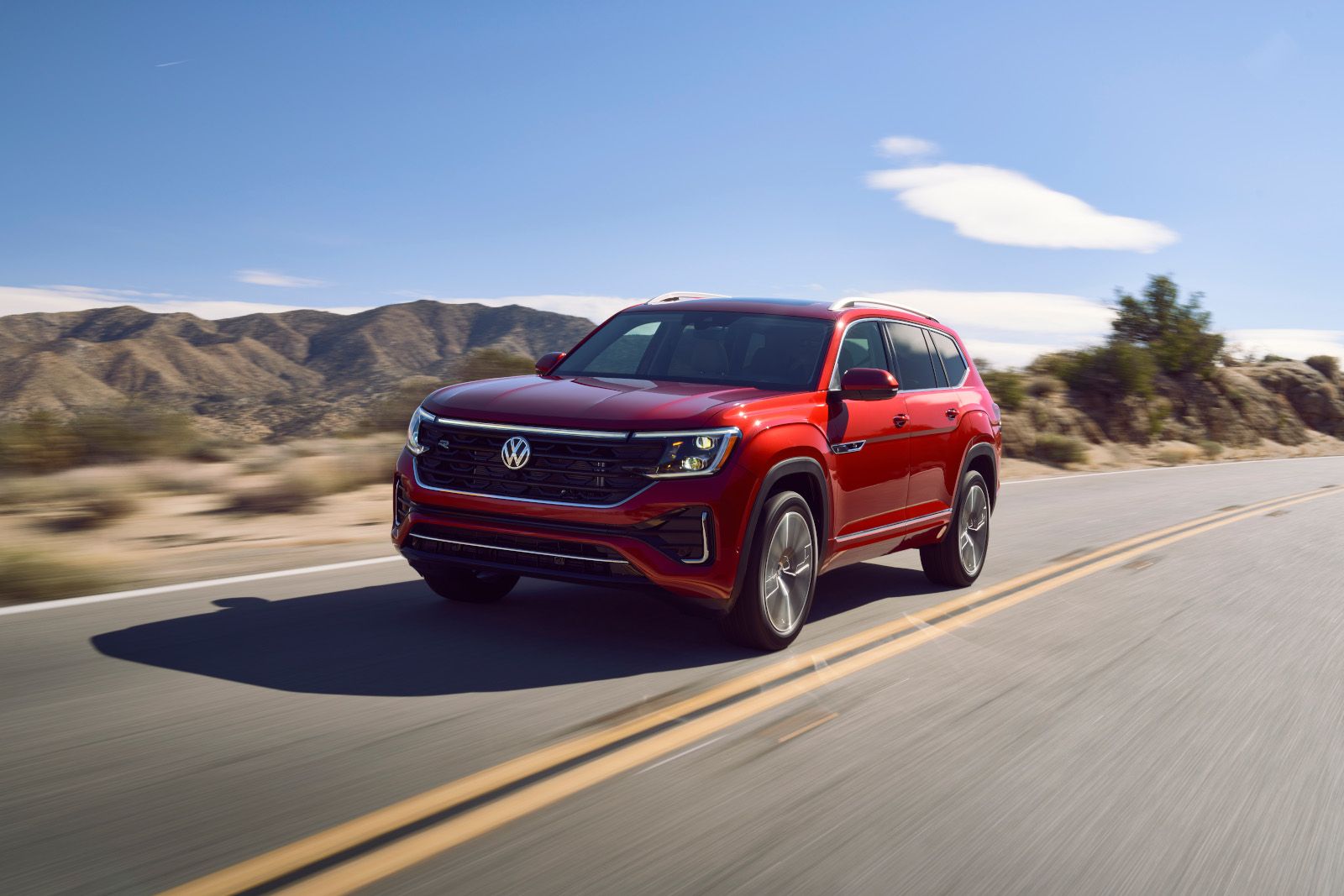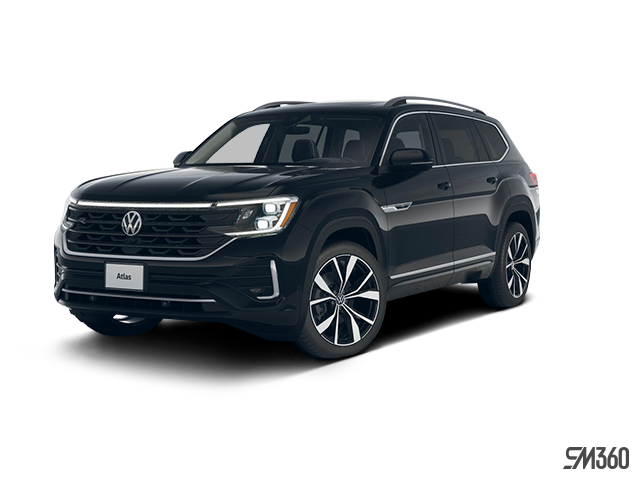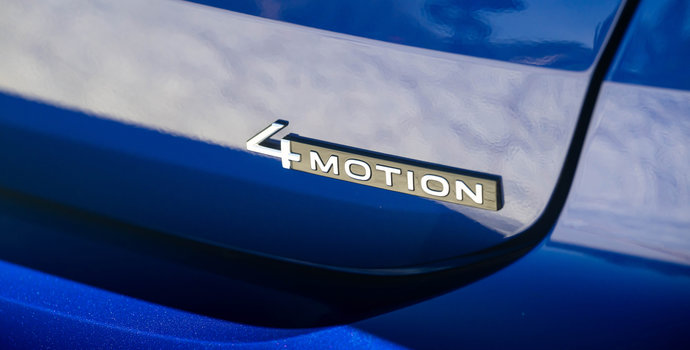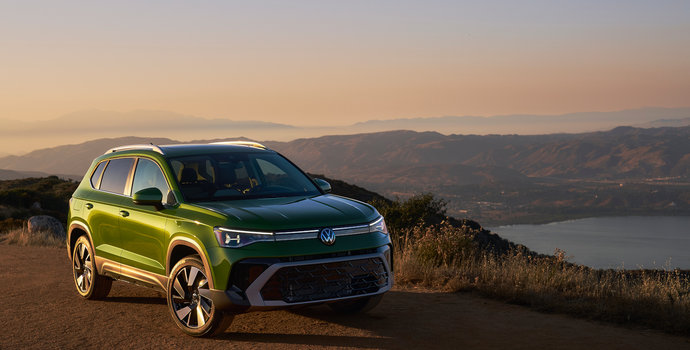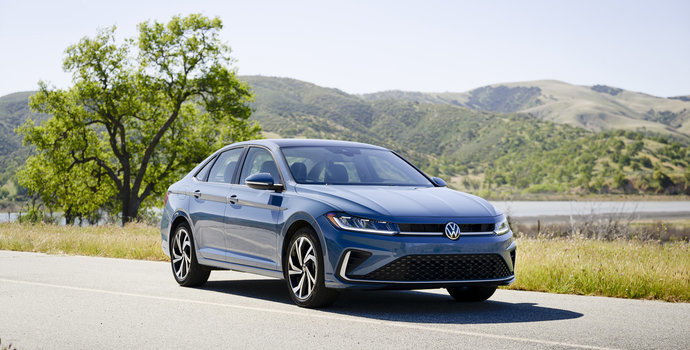Choosing between the 2026 Volkswagen Atlas and the 2026 Volkswagen Tiguan comes down to understanding your specific needs as a driver in Ontario. Both SUVs deliver Volkswagen's engineering quality, advanced safety features, and 4MOTION All-Wheel Drive capability, but they serve distinctly different purposes. The Atlas offers three-row seating for seven passengers and a substantial cargo capacity, making it ideal for larger families and those who frequently transport groups. The Tiguan offers a more compact footprint, seating five, and delivers better fuel economy and easier maneuvering through Toronto's urban streets.
This comparison breaks down the key differences between these two popular Volkswagen SUVs to help you determine which model aligns with your lifestyle. Whether you're navigating downtown Toronto traffic or planning weekend getaways to Muskoka, understanding how these vehicles differ in terms of size, performance, technology, and capability will help guide you toward the right choice for your family.
At a Glance: 2026 Atlas vs. 2026 Tiguan
|
Feature
|
2026 VW Atlas
|
2026 VW Tiguan
|
|
Seating Capacity
|
7 passengers (3 rows)
|
5 passengers (2 rows)
|
|
Engine (Base)
|
2.0 L TSI, 269 hp, 273 lb-ft
|
2.0 L TSI, 201 hp, 221 lb-ft
|
|
Engine (Top Trim)
|
2.0 L TSI, 269 hp, 273 lb-ft
|
2.0 L TSI Turbo, 268 hp, 258 lb-ft
|
|
Cargo Capacity (Seats Folded)
|
2,735 litres
|
1,668 litres
|
|
Towing Capacity
|
2,268 kg (5,000 lbs)
|
817 kg (1,800 lbs)
|
|
Fuel Economy (Combined)
|
11.0 L/100 km
|
9.2 L/100 km
|
|
Overall Length
|
5,097 mm
|
4,684 mm
|
|
Wheelbase
|
2,980 mm
|
2,791 mm
|
|
Drivetrain
|
4MOTION AWD, 8-speed automatic
|
4MOTION AWD, 8-speed automatic
|
Size and Seating: The Primary Differentiator
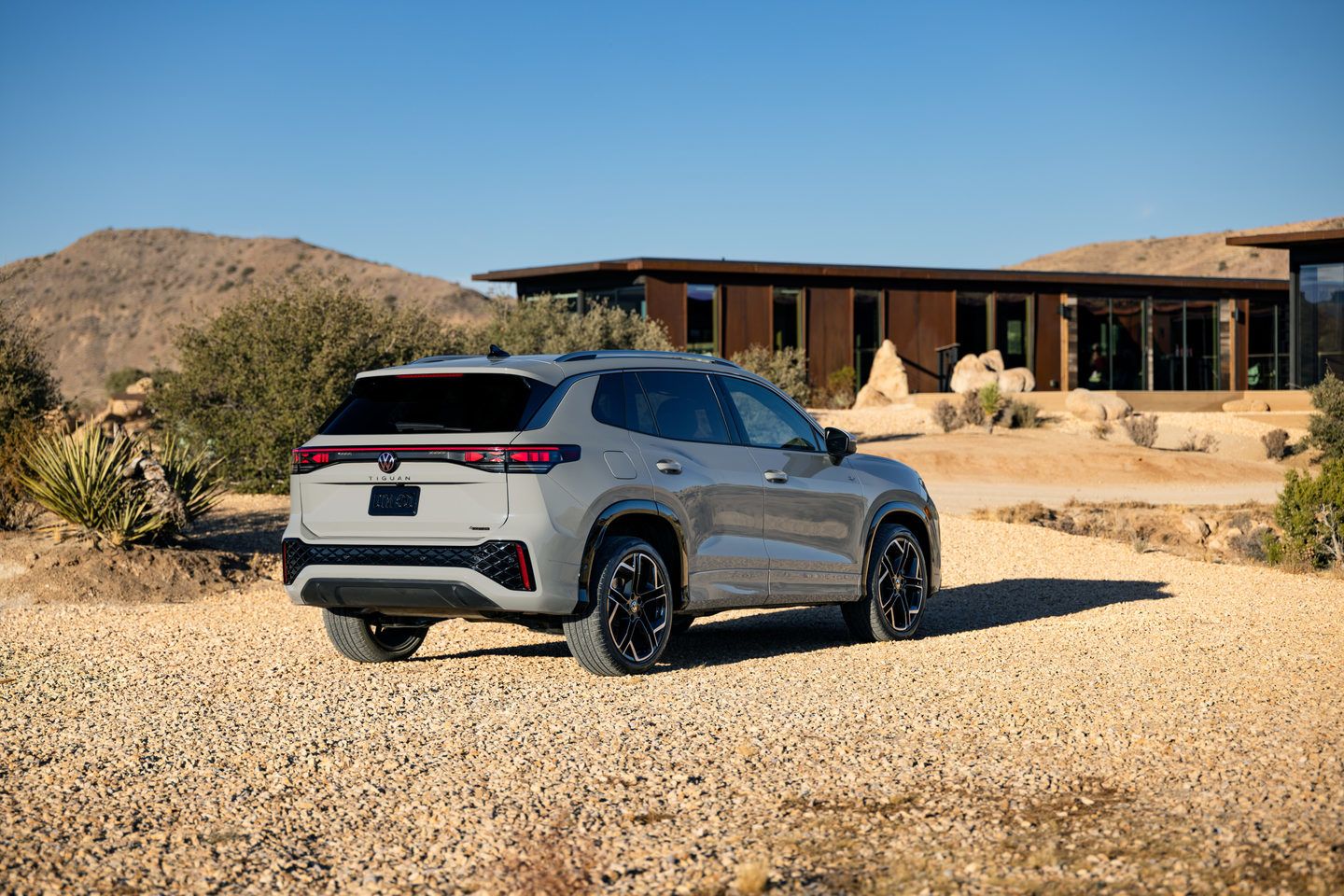
The most significant difference between these two SUVs is their size and seating configuration. The Atlas measures 5,097 mm in length with a 2,980 mm wheelbase, providing the space necessary for three rows of seating. This makes it one of the largest SUVs in Volkswagen's lineup, capable of comfortably accommodating seven passengers. The second-row seats feature a 60/40 split-folding design with "Easy Access" to the third row, making it practical for families who regularly transport children, teens, or multiple passengers.
The Tiguan adopts a more compact design, measuring 4,684 mm in length with a 2,791 mm wheelbase. This SUV seats five passengers across two rows, making it better suited for smaller families, couples, or individuals who prioritize manoeuvrability over maximum passenger capacity. The shorter length and tighter turning radius make the Tiguan easier to park in Toronto's crowded neighbourhoods and navigate through downtown traffic.
Key considerations:
- Atlas: Best for families with three or more children, carpooling needs, or frequent group outings
- Tiguan: Best for couples, small families, or urban drivers who value parking ease and agility
- Atlas height: 1,787 mm vs. Tiguan height: 1,688 mm (both fit standard residential garages)
Performance and Efficiency
Both SUVs share Volkswagen's 2.0 L TSI turbocharged four-cylinder engine architecture, but with different outputs depending on trim level. The Atlas delivers 269 hp and 273 lb-ft of torque across all trims, providing consistent power for its larger size and weight. This engine is paired with an 8-speed automatic transmission featuring Tiptronic and 4MOTION All-Wheel Drive, offering smooth acceleration and confident highway merging.
The Tiguan offers two engine configurations. The base Trendline and Comfortline trims are equipped with a 2.0 L TSI engine, producing 201 hp and 221 lb-ft of torque. The new Tiguan Turbo Highline R-Line trim upgrades to 268 hp and 258 lb-ft of torque, matching the Atlas's power output while maintaining the Tiguan's lighter curb weight of 3,840 lb (1,728 kg) compared to the Atlas's 4,620 lb (2,050 kg).
Fuel economy reflects these differences in size and weight. The Tiguan achieves 9.2 L/100 km combined (10.4 L/100 km in the city, 7.6 L/100 km on the highway), making it more economical for daily commuting and urban driving in Ontario. The Atlas returns 11.0 L/100 km combined (12.4 L/100 km city, 9.4 L/100 km highway for Highline and Execline trims), which remains competitive for a three-row SUV of its size.
Cargo Capacity and Towing
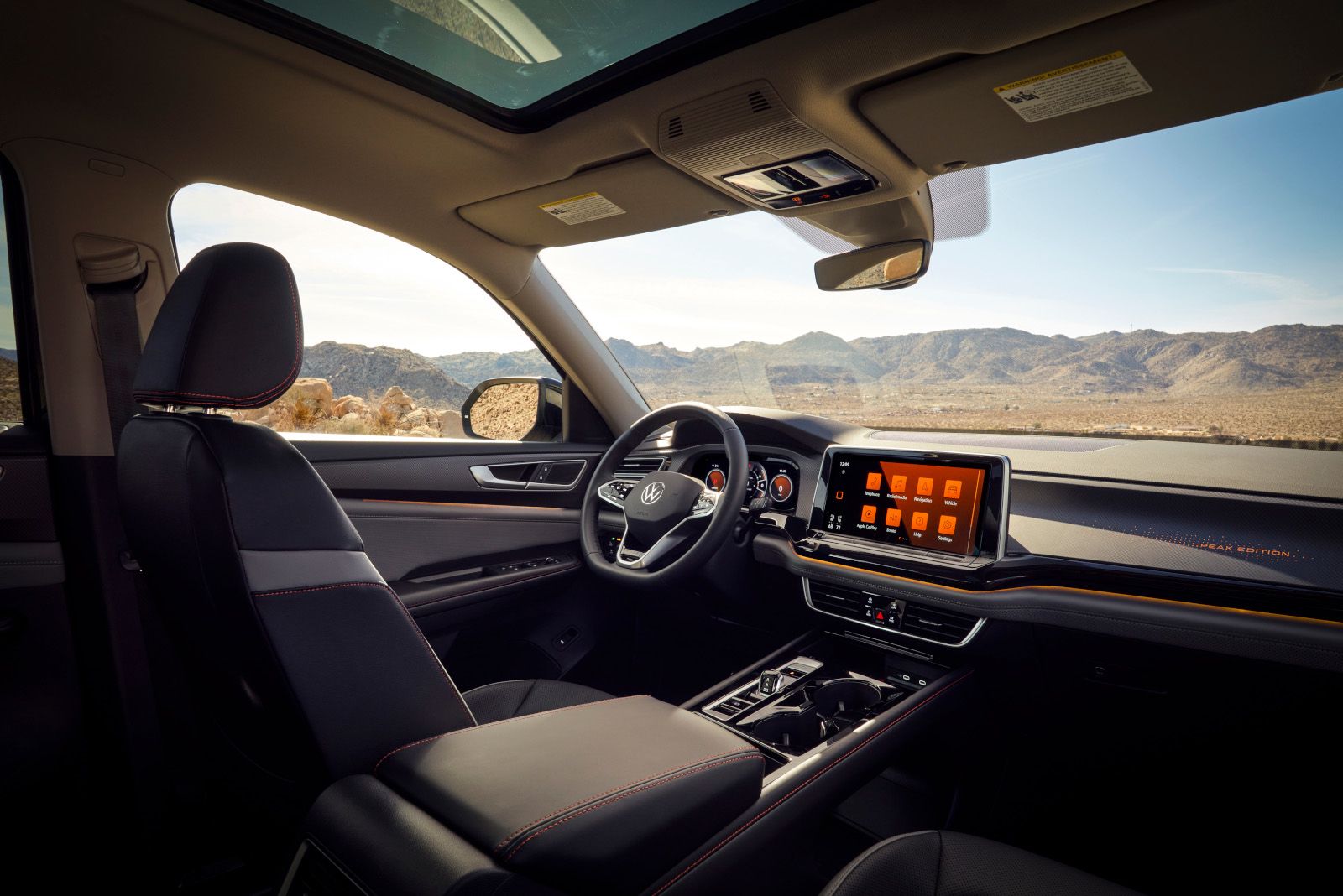
The Atlas excels in cargo versatility with 2,735 litres of space when all seats behind the first row are folded down. This expansive cargo area accommodates everything from sports equipment to furniture, making it practical for families who regularly transport large items or plan extended road trips. The power tailgate features Easy Open and Easy Close functions, simplifying loading and unloading.
For towing needs, the Atlas offers a maximum capacity of 2,268 kg (5,000 lbs) when properly equipped, enabling you to tow boats, trailers, or campers for weekend getaways to the cottage. The Tiguan offers a towing capacity of 817 kg (1,800 lbs) on the base Trendline trim, suitable for smaller trailers or cargo carriers, but not designed for heavy-duty towing. It also features a maximum cargo space of 1,668 L with the second-row seats folded flat.
Cargo and towing comparison:
- Atlas: 2,735 litres cargo space, 2,268 kg (5,000 lbs) towing capacity
- Tiguan: 1,668 litres cargo space, 817 kg (1,800 lbs) towing capacity
Technology and Interior Features
Both SUVs feature Volkswagen's latest Digital Cockpit Pro, which features a 10.25-inch configurable instrument cluster and advanced infotainment systems. The Atlas Highline trim features a 12.0-inch touchscreen with navigation, wireless App-Connect (Android Auto and Apple CarPlay), and a Harman Kardon Premium Audio System with 10 speakers and a subwoofer. The system integrates with the myVW mobile app for connected vehicle services, remote start, and vehicle status monitoring.
The Tiguan matches this technology offering with its own 10.25-inch Digital Cockpit Pro and available 15.0-inch display on the Turbo Highline R-Line trim. This top-tier Tiguan also features a Driving Experience Dial in the centre console for easy adjustment of volume, Drive Mode Select, and the new Atmospheres feature, which synchronizes ambient lighting with audio settings. The Tiguan Turbo includes a 12-speaker Harman Kardon sound system, wireless charging, and 3-zone Climatronic Touch automatic climate control.
Both vehicles offer comprehensive IQ.DRIVE driver assistance features, including Travel Assist (level 2-ready semi-automated driving assistance), Front Assist with Automatic Emergency Braking and Pedestrian Monitoring, Active Blind Spot Monitor, Rear Traffic Alert, Adaptive Cruise Control with Stop and Go, and Lane Assist. The Atlas includes a 360° Area View camera system as standard on the Highline trim, while the Tiguan offers this feature on higher trims.
Interior Comfort and Materials
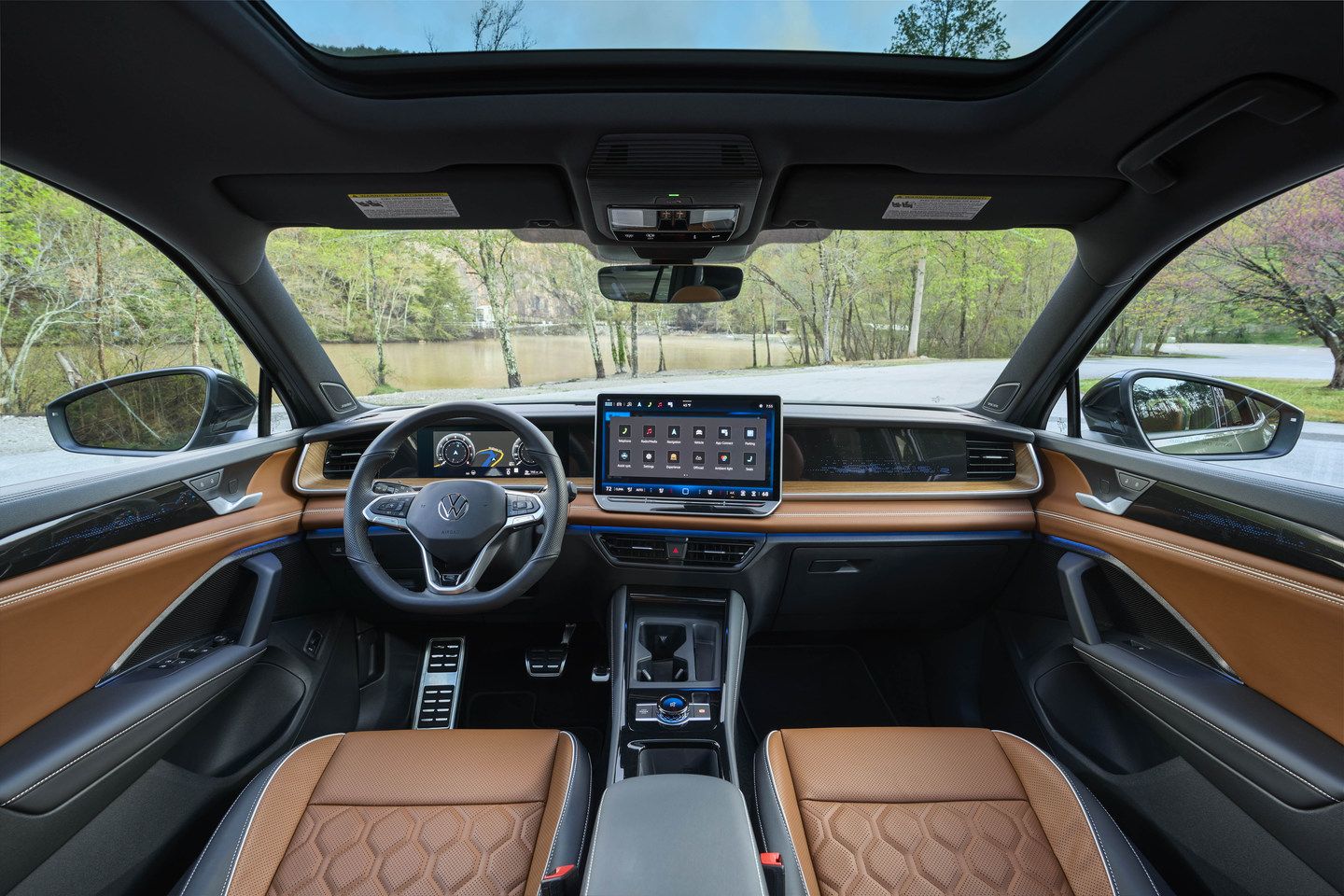
The Atlas prioritizes space and comfort with available ventilated front seats, heated front and outer rear seats, and a 10-way power-adjustable driver's seat with memory function. The Highline trim features leather seating surfaces, interior ambient lighting customizable up to 30 colours, and a panoramic power sunroof. Second-row sunshades provide additional comfort for rear passengers on sunny days.
The Tiguan Turbo Highline R-Line showcases premium materials, including genuine walnut wood décor, a wrapped and double-stitched centre console, and upgraded Varenna leather seating surfaces. The front seats offer 12-way power adjustment with quilted leather surfaces, 10-point full-back massage, and ventilation. The heated steering wheel, 30-colour ambient lighting, and heated rear outboard seats create an upscale environment that rivals larger luxury SUVs.
Safety and Warranty
Both vehicles include comprehensive airbag systems. The Atlas features front, side, and Side Curtain Protection airbags, while the Tiguan introduces four additional airbags for a total of 10, including driver knee, centre, and rear side airbags. Electronic Stability Control, Hill Hold Assist, Hill Descent Control, and Direct Tire Pressure Monitoring System come standard on both models.
Volkswagen backs both SUVs with a 4-year/80,000 km new-vehicle limited warranty, a 5-year/100,000 km powertrain limited warranty, and a 4-year/80,000 km roadside assistance plan. This coverage includes battery jump start, flat-tire service, lock-out service, gasoline delivery, emergency winching, and trip-interruption benefits for warrantable repairs.
Which SUV is Right for You?
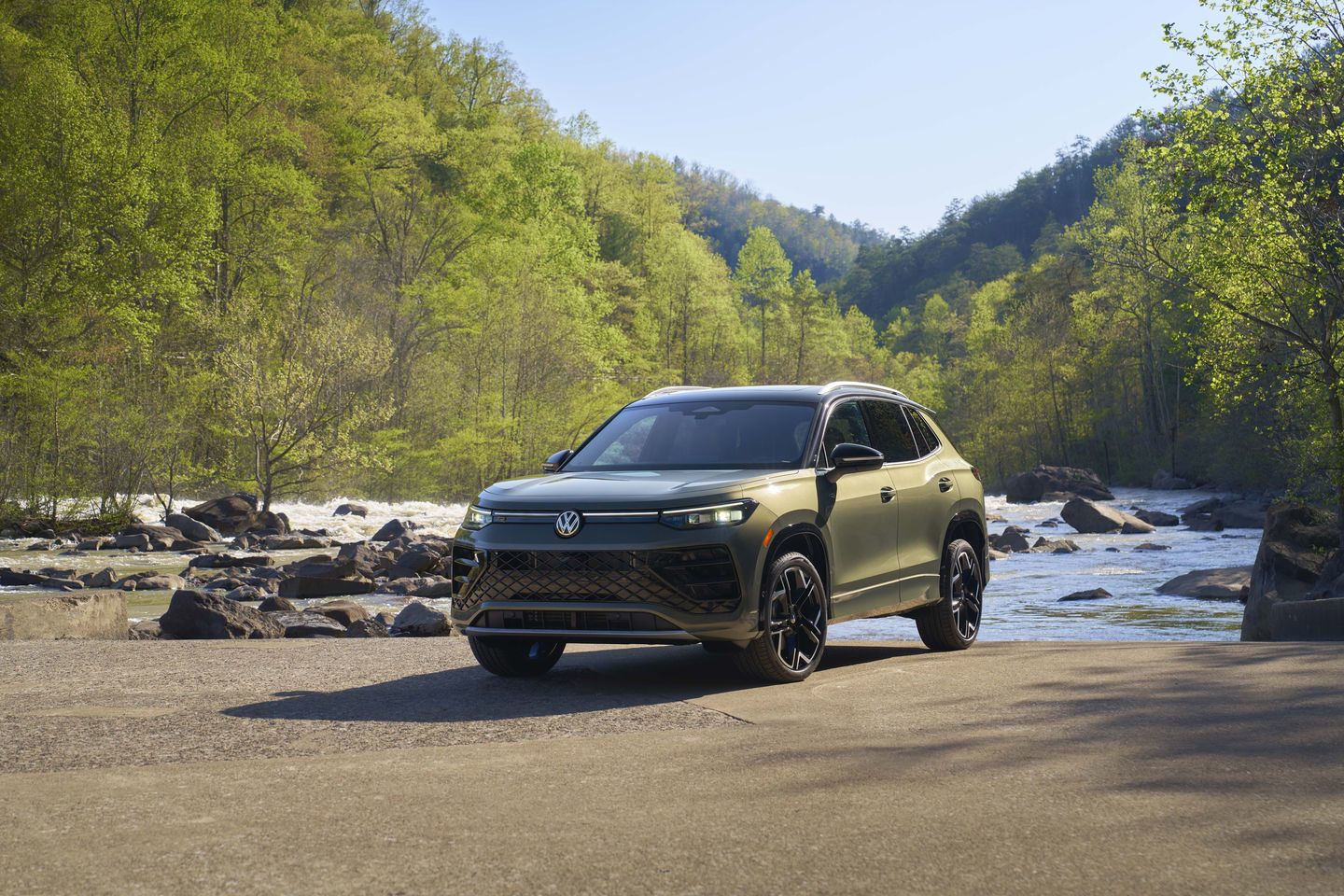
Your choice between the Atlas and Tiguan depends on your specific transportation needs and driving environment in Ontario. Consider the Atlas if you regularly transport more than five passengers, need maximum cargo flexibility for family activities or road trips, plan to tow boats or trailers, or simply prefer the commanding presence and interior space of a larger SUV. The Atlas suits families with multiple children, those who frequently carpool, or buyers who want one vehicle capable of handling any situation.
The Tiguan makes more sense if you primarily transport two to five passengers, navigate Toronto's urban environment daily, prioritize fuel economy for your commute, prefer easier parking and manoeuvrability, or want a more athletic driving experience with the available Turbo engine. The Tiguan appeals to small families, empty nesters, or urban professionals who value efficiency and agility over maximum passenger capacity.
Decision framework:
- Choose Atlas for: 6-7 passenger needs, heavy towing, maximum cargo space, suburban/highway driving
- Choose Tiguan for: 2-5 passenger needs, urban driving, fuel efficiency, easier parking, sporty performance (Turbo trim)
Experience Both SUVs at Volkswagen Midtown
The best way to determine which Volkswagen SUV fits your lifestyle is to experience both models firsthand. Visit Volkswagen Midtown in Toronto to explore the 2026 Atlas and 2026 Tiguan, compare their interior space and features, and take both vehicles for a test drive through real-world Toronto driving conditions. Our team can walk you through the specific trim levels, technology packages, and available options to help you make an informed decision based on your family's needs and budget.
You might also be interested in these blogs:


